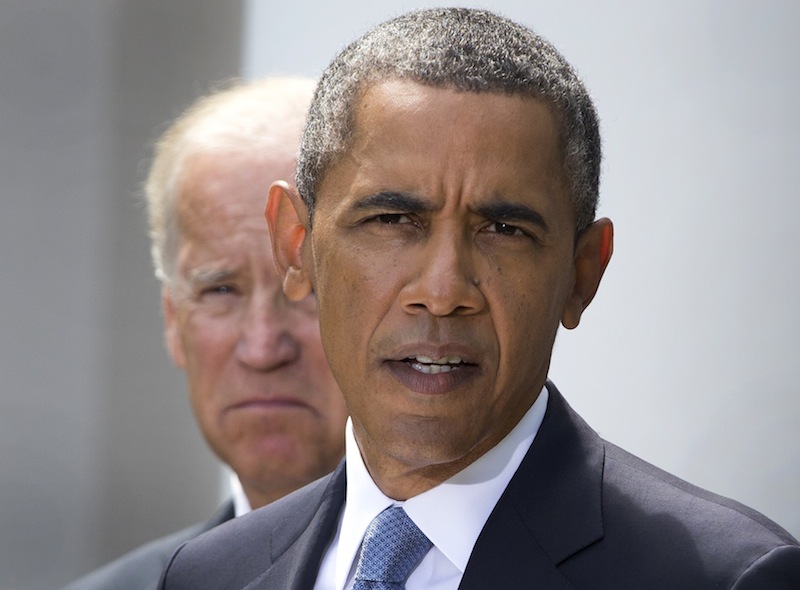The vote counts for congressional authorization for military strikes in Syria look grim, though that could change. But what if it doesn’t? President Obama and his staff have consistently refused to say what the president would do if Congress were to deny his request for authorization to use force. If he decided to strike Bashar al-Assad’s regime anyway — something he has said is within his legal authority — then the White House could turn to 1999 and the Clinton administration’s handling of the war in Kosovo as a roadmap.
The facts don’t line up identically, but they’re close enough, some argue. President Clinton authorized air strikes in Kosovo in March 1999. A month later, the House took votes on a declaration of war and an authorization for the use of military force (i.e. what Congress is considering now) and rejected them both. But a month after that, the House passed a funding measure that kept money flowing for the Kosovo intervention.
“In short, and simplifying a bit, Congress declined to formally authorize Clinton’s use of force in Kosovo, but it funded his efforts,” Jack Goldsmith, a Harvard law professor and former assistant U.S. attorney general, wrote on his blog last week.
It’s not a given that the Obama administration would take the same course. But there are plenty of indications that they’re at least considering it. For starters, when pressed by reporters about how he would respond to a no vote in Congress, the president has never given a straight answer. Neither have his surrogates. And over the weekend, one of the most plugged in reporters in Washington, CNBC’s John Harwood, suggested that the White House was seriously debating military action without congressional approval.
If Senate approves Syria resolution & House whip count looks bad, no one should be surprised if House vote gets scrapped & then US strikes
— John Harwood (@JohnJHarwood) September 9, 2013
Of course, it’s not that simple. Unlike Clinton, Obama is going to Congress before taking any action. If he then acted against its will, the political ramifications could be devastating. As The New York Times reported last week, White House aides consider it “almost unthinkable” that the president would defy Congress, despite his refusal to rule it out.
As a practical matter, it would leave him more isolated than ever and seemingly in defiance of the public’s will at home. As a political matter, it would almost surely set off an effort in the House to impeach him, which even if it went nowhere could be distracting and draining.
Deputy national security adviser Tony Blinken, while insisting Obama had the authority to act independently, told NPR last week that it was “neither his desire nor his intention to use that authority absent Congress backing him.” But that’s far from an unequivocal no.
If Obama did go it alone, what would Congress do? It seems reasonably likely that the Senate will still approve a use-of-force resolution, as Harwood suggests, so it’s hard to imagine much backlash in that chamber if the president moves on his own. As for the House, Speaker John Boehner (R-OH), Majority Leader Eric Cantor (R-VA) and Minority Leader Nancy Pelosi (D-CA) have endorsed the strikes; they could simply leave the issue alone if Obama acts unilaterally.
It’s hard to know if the public would press Congress to stop Obama, too. Polling shows general opposition to Syria strikes, but the public also opposed intervention in Kosovo and there wasn’t widespread outrage toward Clinton that demanded a congressional response.
As for funding, there would be two problems for those opposed to the strikes: 1) To stop funding, they’d likely need a vehicle independent of the continuing resolution that Congress is expected to consider this month, or else risk a government shutdown; and 2) They could face backlash of their own for depriving funding for U.S. forces engaged in battle, as Goldsmith noted in his analysis.
One House Democratic aide told TPM that Obama could probably strike Syria without obstruction if Congress failed to directly authorize military action.
“A no vote is a failure to authorize, not a prohibition. There’s no way Congress would vote to prohibit funding,” the aide said. “Plus, like Kosovo, you probably couldn’t get the votes to cut off presidential action.”
There’s one last wrinkle to this “Kosovo option” that Goldsmith highlighted. A year after the United States successfully intervened, the Justice Department filed a brief explaining how Clinton’s action aligned with his constitutional authority and the War Powers Act. In effect, the Justice Department reasoned that, by authorizing funding for military action, Congress had tacitly authorized the military action itself.
If the debate over Syria goes the same way, Obama could utilize the same rationale.
“If Congress declines to authorize force but simultaneously appropriates money for the use of force in Syria, the President could, relying on the (DOJ) opinion, construe this appropriation as constitutional authorization for the use of force,” Goldsmith wrote. “If appropriations for Syria are on the table, Congress needs to be aware that it can (according to the Executive branch, backed by precedent) authorize force in that manner as well, even if it votes down formal authorization.”









